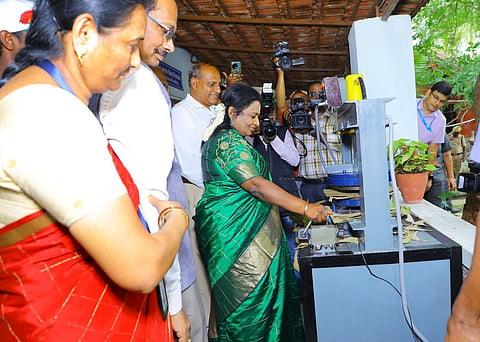

HYDERABAD: Tens of thousands of crores have been spent for the welfare of tribals and the development of tribal areas by successive governments. Hypothetically speaking, had those funds been distributed equally among the tribal population, every tribal in the state would have turned into a millionaire, if not a billionaire, feel some tribal leaders. Perhaps, Governor Dr Tamilisai Soundararajan feels that changing lives and livelihoods doesn’t need that kind of funding. With a low-cost idea which could grow to become a successful startup, she has been on a mission to improve the livelihoods of the tribals belonging to the primitive vulnerable tribal groups (PVTG) in the four tribal hamlets adopted by her in Adilabad and Bhadradri-Kothagudem districts.
Approximately 28 tribal youth have been trained at the National Institute of Rural Development and Panchayati Raj’s (NIRDPR) Rural Technology Park (RTP) in Rajendra Nagar, in making plates made up of leaves, manually and using machinery in the first phase of the initiative, which will cover more tribals from the selected hamlets. Using the leaves of Butea monosperma, Bauhinia vahlii and other edible fruit varieties, tribals are being taught to make eight different products which include leaf plates of varied sizes, bowls and indentations to prepare idlis.
RD Raju, a resource person for the initiative, said that food stored in these plates will not go stale for at least 18 hours, and idlis prepared in these leaf indentations will stay fresh for 32 hours.
Talking about the cost-effectiveness from the consumer’s perspective, he says that though they are slightly more expensive than paper or plastic plates sold in the market they are beneficial to the environment, the reason why he calls the initiative “Aakulatho Ayush,” (well-being through leaves) which means longevity through leaves.
The governor has assured the tribals that they will be supported with machinery and working capital to the tune of Rs 2 lakh per village, which is the cost of establishing each manufacturing unit. According to Dr G Narendra Kumar, director general of NIRDPR, a couple could make Rs 800 per day by making the leaf plates, and this is not only an additional income for tribals, but will also reduce the burden on the National Rural Employment Guarantee Scheme (NREGS).